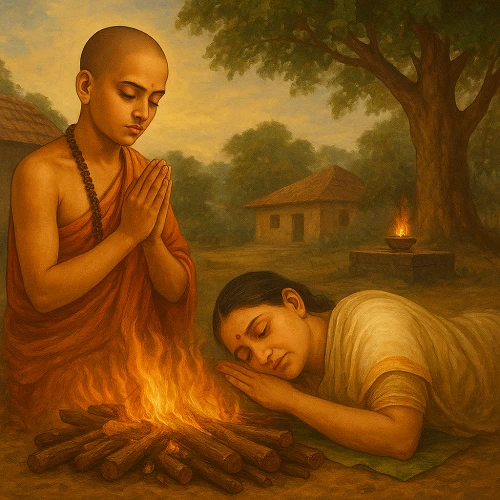Adi Shankaracharya Cremates his mother

Would you obey society’s rules… or honor your mother’s last wish?
When rules stood against love, Adi Shankara chose his mother.
This is the story of how the great saint, who had renounced the world, returned home to fulfill his mother’s final desire — and showed that true wisdom is never without compassion.
One day in Sringeri, Shankara felt something deep in his heart. His mother, Aryamba, was near the end of her life. Without waiting, he left at once with his childhood friend Citsukha. On the way, they spoke of yoga and spiritual powers, but Shankara’s mind was on only one thing — Will I reach in time to see Mother?
After many days of travel, they reached Kalady, Shankara’s birthplace. Inside the simple house, his mother lay weak and thin. Sixteen years had passed since she had last seen her only son. When Aryamba saw him, her face lit with joy.
Though Shankara was a monk who had renounced all attachment, his heart melted. He bowed at her feet and said softly, “Mother, don’t be sad. I am here. Tell me what you wish.”
Aryamba whispered, “My son, it is my good fortune to see you again. I do not wish to live longer in this weak body. Help me see God, and when I am gone, perform my last rites as I have asked.”
Shankara began to speak about the highest truth — Brahman, the eternal reality that is formless, without birth or death, pure consciousness and bliss. But Aryamba shook her head. “My mind cannot rest in an empty idea,” she said. “Show me the Lord Himself — a Divine Person whom I can love.”
Out of deep love for his mother, Shankara sang a hymn to Lord Shiva. Suddenly, she saw fierce messengers of Shiva appear, and fear filled her heart. To calm her, Shankara then sang of Lord Vishnu — the beautiful blue Lord resting on the serpent, with Goddess Lakshmi at His feet, shining brighter than the sun.
As he sang, Aryamba’s heart was full of peace. She no longer felt pain. Within her, she saw Lord Vishnu Himself, smiling in compassion. With a gentle smile, she closed her eyes forever. Vishnu’s divine attendants came in a shining chariot and carried her soul through heavenly realms to Vaikuntha, His eternal home.
But Shankara’s task was not yet over. He had promised to perform her last rites. The villagers objected. “A monk must not do this for his parents,” they said. They even refused to give him firewood for the cremation. But Shankara stood firm. “I gave my word to my mother,” he said. “I will keep it.”
To Shankara, rules were like a boat. The purpose of a boat is to carry us across the ocean. Once you’ve crossed, you do not carry the boat on your back — you leave it behind. Rules serve life, not the other way around.
With no wood at hand, Shankara laid her body on fresh banana leaves, which normally do not burn. He raised his right hand and In reverence to the sage, Fire descended and consumed even the green leaves.
As the flames rose, Shankara composed five verses called the Mathru Panchaka — a hymn honoring his mother and the greatness of motherhood. His words showed the world that true renunciation is not cold, but full of compassion.
In later years, the very villagers who had opposed him repented. For centuries, they lit a lamp under an Ashoka tree where Aryamba had been cremated — honoring the mother who gave birth to a divine child.